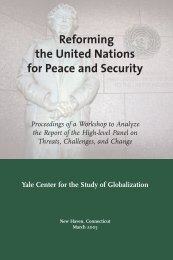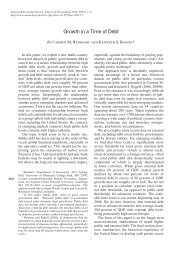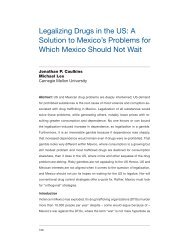The collapse of global trade, murky protectionism, and the crisis:
The collapse of global trade, murky protectionism, and the crisis:
The collapse of global trade, murky protectionism, and the crisis:
Create successful ePaper yourself
Turn your PDF publications into a flip-book with our unique Google optimized e-Paper software.
VOX<br />
Research-based policy analysis <strong>and</strong> commentary from leading economists<br />
Survey measures <strong>of</strong> <strong>the</strong> decline in <strong>trade</strong> credit<br />
According to an unreleased BAFT (Banker's Association for Trade <strong>and</strong> Finance) survey,<br />
flows <strong>of</strong> <strong>trade</strong> finance to developing countries seem to have fallen by some 6% or<br />
more year-on-year – probably more than <strong>the</strong> reduction in <strong>trade</strong> flows – hence implying<br />
that <strong>the</strong> lack <strong>of</strong> <strong>trade</strong> financing is indeed an issue for <strong>the</strong>se countries. If such numbers<br />
were to be confirmed (at least local bankers seem to agree on <strong>the</strong>m according to<br />
<strong>the</strong> survey), that would mean that <strong>the</strong> market gap could be well over <strong>the</strong> $25 billion<br />
estimate mentioned above (up to $100 billion, possibly more). <strong>The</strong> scarcity <strong>of</strong> <strong>trade</strong><br />
finance is very likely to accelerate <strong>the</strong> slowdown <strong>of</strong> world <strong>trade</strong> <strong>and</strong> output.<br />
Of course, it can be argued that such "exogenous" factors as liquidity squeeze,<br />
exchange rate fluctuations <strong>and</strong> o<strong>the</strong>rs impacting risk are not specific to <strong>trade</strong> finance.<br />
Any unhedged cross-border flow is likely to be affected by exchange rate fluctuations<br />
<strong>and</strong> increased risk. Likewise, all credit is dampened by <strong>the</strong> credit crunch. <strong>The</strong> combination<br />
<strong>of</strong> scarce liquidity <strong>and</strong> a re-assessment <strong>of</strong> customer <strong>and</strong> country risks resulted<br />
in a sharp increase in <strong>the</strong> price <strong>of</strong> credit transactions. Spreads on 90-days letters <strong>of</strong><br />
credit have ramped up in <strong>the</strong> course <strong>of</strong> 2008 from 10 to 16 basis points on a normal<br />
basis, to 250 to 500 basis for letters <strong>of</strong> credit issued by emerging <strong>and</strong> developing<br />
economies. Even under stress, it is hard to believe this sort <strong>of</strong> loan – which is among<br />
<strong>the</strong> safest <strong>and</strong> most self-liquidating form <strong>of</strong> finance due to strong receivables <strong>and</strong> marketable<br />
collaterals – could see its price increase by a factor <strong>of</strong> 10 to 50.<br />
While overall flows cannot be estimated with precision, <strong>the</strong> overall increase in<br />
spreads requested for opening letters <strong>of</strong> credit, particularly at times when liquidity<br />
constraint hitting <strong>the</strong> money market seems to have relaxed a bit, <strong>and</strong> o<strong>the</strong>r factors<br />
point to a mismatch between supply <strong>and</strong> dem<strong>and</strong>.<br />
Mismatch between supply <strong>and</strong> dem<strong>and</strong><br />
Why has this happened? Two arguments are put forward. Public sector actors emphasise<br />
market failure while private sector actors tend to blame <strong>the</strong> costs associated with<br />
implementing <strong>the</strong> Basel II rules. 20<br />
<strong>The</strong> market failure argument relies on <strong>the</strong> inability <strong>of</strong> private sector operators to<br />
avoid herd behaviour, especially when <strong>the</strong> credit risk <strong>and</strong> country risk are confused<br />
(e.g. amid rumours <strong>of</strong> sovereign default). Cooperation between <strong>global</strong> suppliers dries<br />
up during <strong>crisis</strong>, with <strong>the</strong> best run ones refusing to <strong>of</strong>f load/refinance in <strong>the</strong> secondary<br />
markets <strong>the</strong> positions <strong>of</strong> banks that are in less favourable liquidity situations, or<br />
carrying excess exposure to <strong>trade</strong> credit. <strong>The</strong> failure <strong>of</strong> private lenders, which account<br />
for an estimated 80% <strong>of</strong> <strong>the</strong> <strong>trade</strong> loan market, to meet <strong>the</strong> dem<strong>and</strong> for cross-border<br />
<strong>trade</strong> finance is unusual given <strong>the</strong> self-liquidating nature <strong>of</strong> <strong>the</strong> market (<strong>of</strong>ten backed<br />
by strong deliverables, e.g <strong>the</strong> cargo itself acts as collateral for <strong>the</strong> loan).<br />
On <strong>the</strong> regulatory side, commercial bankers have long complained about <strong>the</strong><br />
implementation <strong>of</strong> Basel II rules, which are regarded as having a pro-cyclical effect on<br />
<strong>the</strong> supply <strong>of</strong> credit. That is, in poor market conditions, <strong>trade</strong> finance would be<br />
unfairly treated as capital requirements for it would be significantly increased, particularly<br />
for counterparty risk with developing countries' customers. <strong>The</strong> system <strong>of</strong> rat-<br />
20 <strong>The</strong>se arguments are not necessarily new (see WTO 2003, page 6) but at present <strong>the</strong>y may well apply<br />
with even greater force.<br />
76





